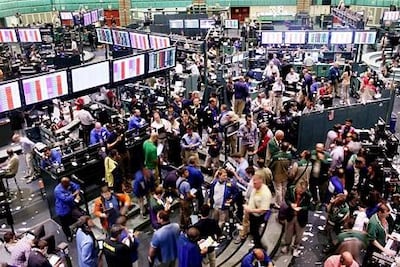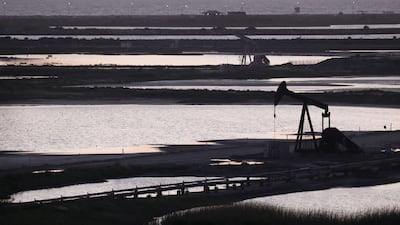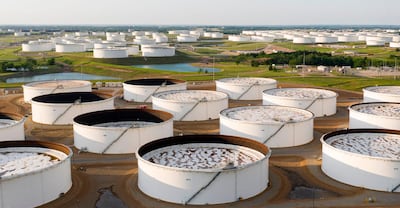Syed Shah usually buys and sells stocks and currencies through his Interactive Brokers account, but he couldn’t resist trying his hand at some oil trading on April 20, the day prices plunged below zero for the first time ever. The day trader, working from his house in a Toronto suburb, figured he couldn’t lose as he spent $2,400 (Dh8,815) snapping up crude at $3.30 a barrel, and then 50 cents. Then came what looked like the deal of a lifetime: buying 212 futures contracts on West Texas Intermediate for an astonishing penny each.
What he didn't know was oil's first trip into negative pricing had broken Interactive Brokers Group. Its software couldn't cope with that pesky minus sign, even though it was always technically possible - though this was an outlandish idea before the pandemic - for the crude market to trade below $0. Crude was actually around negative $3.70 a barrel when Mr Shah's screen had it at 1 cent. Interactive Brokers never displayed a subzero price to him as oil kept diving to end the day at minus $37.63 a barrel.
I felt like everything was going to be taken from me, all my assets
At midnight, Mr Shah got the devastating news: he owed Interactive Brokers $9 million. He’d started the day with $77,000 in his account.
“I was in shock,” the 30-year-old said in a phone interview. “I felt like everything was going to be taken from me, all my assets.”
To be clear, investors who were long those oil contracts had a brutal day, regardless of what brokerage they had their account in. What set Interactive Brokers apart, though, is that its customers were flying blind, unable to see that prices had turned negative, or in other cases locked into their investments and blocked from trading. Compounding the problem, and a big reason why Mr Shah lost an unbelievable amount in a few hours, is that the negative numbers also blew up the model Interactive Brokers used to calculate the amount of margin - aka collateral - that customers needed to secure their accounts.
Thomas Peterffy, the chairman and founder of Interactive Brokers, says the journey into negative territory exposed bugs in the company’s software. “It’s a $113m mistake on our part,” the 75-year-old billionaire said in an interview on Wednesday. Since then, his firm revised its maximum loss estimate to $109.3m. It’s been a moving target from the start; on April 21, Interactive Brokers figured it was down $88m from the incident.
Customers will be made whole, Mr Peterffy said. “We will rebate from our own funds to our customers who were locked in with a long position during the time the price was negative any losses they suffered below zero.”
That could help Mr Shah. The day trader in Mississauga, Canada, bought his first five contracts for $3.30 each at 1:19 pm that historic Monday. Over the next 40 minutes or so he bought 21 more, the last for 50 cents. He tried to put an order in for a negative price, but the Interactive Brokers system rejected it, so he became more convinced that it wasn’t possible for oil to go below zero. At 2:11 pm, he placed that dream-turned-nightmare trade at a penny.
It was only later that night that he saw on the news that oil had plunged to the never-before-seen price of negative $37.63 per barrel. What did that mean for the hundreds of contracts he’d bought? He frantically tried to contact support at the firm, but no one could help him. Then that late-night statement arrived with a loss so big it was expressed with an exponent.
The problem wasn’t confined to North America. Thousands of miles away, Interactive Brokers customer Manfred Koller ran into similar trouble. Mr Koller, who lives near Frankfurt and trades from his home computer on behalf of two friends, also didn’t realise oil prices could go negative.
He’d bought contracts for his friends on Interactive Brokers that day at $11 and between $4 and $5. Just after 2 pm New York time, his trading screen froze. “The price feed went black, there were no bids or offers anymore,” he said in an interview. Yet as far as he knew at this point, according to his Interactive Brokers account, he didn’t have anything to worry about as trading closed for the day.
Following the carnage, Interactive Brokers sent him notice that he owed $110,000. His friends were completely wiped out. “This is definitely not what you want to do, lose all your money in 20 minutes,” Mr Koller said.
Besides locking up because of negative prices, a second issue concerned the amount of money Interactive Brokers required its customers to have on hand in order to trade. Known as margin, it’s a vital risk measure to ensure traders don’t lose more than they can afford. For the 212 oil contracts Mr Shah bought for 1 cent each, the broker only required his account to have $30 of margin per contract. It was as if Interactive Brokers thought the potential loss of buying at one cent was one cent, rather than the almost unlimited downside that negative prices imply, he said.
“It seems like they didn’t know it could happen,” Mr Shah said.
But it was known industry wide that CME Group’s benchmark oil contracts could go negative. Five days before the mayhem, the owner of the New York Mercantile Exchange, where the trading took place, sent a notice to all its clearing-member firms advising them that they could test their systems using negative prices. “Effective immediately, firms wishing to test such negative futures and/or strike prices in their systems may utilise CME’s ‘New Release’ testing environments” for crude oil, the exchange said.
Interactive Brokers got that notice, Mr Peterffy said. But he says the firm needed more time to upgrade its trading platform.
“Five days, including the weekend, with the coronavirus going on and a complex system where we have to make many changes, was not a sufficient amount of time,” he said. “The idea we could have bugs is not, in my mind, a surprise.” He also acknowledged the error in the margin model Interactive Brokers used that day.
According to Mr Peterffy, its customers were long 563 oil contracts on Nymex, as well as 2,448 related contracts listed at another company, Intercontinental Exchange. Interactive Brokers foresees refunding $18,815 for the Nymex ones and $37,630 for ICE’s, according to a spokesman.
To give a sense of how far off the Interactive Brokers margin model was that day, similar trades to those Mr Shah placed would have required $6,930 per trade in margin if he placed them at Intercontinental Exchange. That’s 231 times the $30 Interactive Brokers charged.
“I realised after the fact the margin for those contracts is very high and these trades should never have been processed,” he said. He didn’t sleep for three nights after getting the $9m margin call, he said.
Mr Peterffy accepted blame, but said there was little market liquidity after prices went negative, which could’ve prevented customers from exiting their trades anyway. He also laid responsibility on the exchanges and said the company had been in touch with the industry’s regulator, the US Commodity Futures Trading Commission.
“We have called the CFTC and complained bitterly,” Mr Peterffy said. “It appears the exchanges are going scot-free.”
Representatives of CME and Intercontinental Exchange declined to comment. A CFTC spokesman didn’t immediately return a request for comment.
The issue is whose responsibility is this?
The fallout for retail investors like Mr Shah and Mr Koller raises questions over whether they should’ve been allowed to take a position in oil contracts right before they expired, putting them in a situation where they might have had position to have to take possession of barrels of crude oil. Brokers have been grappling with how to shield clients, especially those with small accounts who are clearly incapable of taking physical delivery, since that day. Some, including INTL FCStone, have already blocked certain clients from touching the front-month oil futures contract.
Mr Peterffy said there’s a problem with how exchanges design their contracts because the trading dries up as they near expiration. The May oil futures contract - the one that went negative - expired the day after the historic plunge, so most of the market had moved to trading the June contract, which expires on May 19 and currently trades above $24 a barrel.
“That’s how it’s possible for these contracts to go absolutely crazy and close at a price that has no economic justification,” Mr Peterffy said. “The issue is whose responsibility is this?”
Herc's Adventures
Developer: Big Ape Productions
Publisher: LucasArts
Console: PlayStation 1 & 5, Sega Saturn
Rating: 4/5
'Operation Mincemeat'
Director: John Madden
Cast: Colin Firth, Matthew Macfayden, Kelly Macdonald and Penelope Wilton
Rating: 4/5
MATCH INFO
Real Madrid 2 (Benzema 13', Kroos 28')
Barcelona 1 (Mingueza 60')
Red card: Casemiro (Real Madrid)
How the bonus system works
The two riders are among several riders in the UAE to receive the top payment of £10,000 under the Thank You Fund of £16 million (Dh80m), which was announced in conjunction with Deliveroo's £8 billion (Dh40bn) stock market listing earlier this year.
The £10,000 (Dh50,000) payment is made to those riders who have completed the highest number of orders in each market.
There are also riders who will receive payments of £1,000 (Dh5,000) and £500 (Dh2,500).
All riders who have worked with Deliveroo for at least one year and completed 2,000 orders will receive £200 (Dh1,000), the company said when it announced the scheme.
THE SPECS
Engine: Four-cylinder 2.5-litre
Transmission: Seven-speed auto
Power: 165hp
Torque: 241Nm
Price: Dh99,900 to Dh134,000
On sale: now
ABU DHABI ORDER OF PLAY
Starting at 10am:
Daria Kasatkina v Qiang Wang
Veronika Kudermetova v Annet Kontaveit (10)
Maria Sakkari (9) v Anastasia Potapova
Anastasia Pavlyuchenkova v Ons Jabeur (15)
Donna Vekic (16) v Bernarda Pera
Ekaterina Alexandrova v Zarina Diyas
CONCRETE COWBOY
Directed by: Ricky Staub
Starring: Idris Elba, Caleb McLaughlin, Jharrel Jerome
3.5/5 stars
Wicked: For Good
Director: Jon M Chu
Starring: Ariana Grande, Cynthia Erivo, Jonathan Bailey, Jeff Goldblum, Michelle Yeoh, Ethan Slater
Rating: 4/5
Gulf Under 19s final
Dubai College A 50-12 Dubai College B
Auron Mein Kahan Dum Tha
Starring: Ajay Devgn, Tabu, Shantanu Maheshwari, Jimmy Shergill, Saiee Manjrekar
Director: Neeraj Pandey
Rating: 2.5/5
RESULTS
5pm Maiden (PA) Dh70,000 (Dirt) 1,400m
Winner AF Nashrah, Tadhg O’Shea (jockey), Ernst Oertel (trainer)
5.30pm Maiden (PA) Dh70,000 (D) 1,400m
Winner Mutaqadim, Riccardo Iacopini, Ibrahim Al Hadhrami.
6pm Maiden (PA) Dh70,000 (D) 1,600m
Winner Hameem, Jose Santiago, Abdallah Al Hammadi.
6.30pm Maiden (PA) Dh70,000 (D) 1,600m
Winner AF Almomayaz, Sandro Paiva, Ali Rashid Al Raihe.
7pm Handicap (PA) Dh70,000 (D) 1,800m
Winner Dalil Al Carrere, Fernando Jara, Mohamed Daggash.
7.30pm Handicap (TB) Dh70,000 (D) 1,000m
Winner Lahmoom, Royston Ffrench, Salem bin Ghadayer.
8pm Handicap (PA) Dh70,000 (D) 1,000m
Winner Jayide Al Boraq, Bernardo Pinheiro, Khalifa Al Neyadi.
Europa League group stage draw
Group A: Villarreal, Maccabi Tel Aviv, Astana, Slavia Prague.
Group B: Dynamo Kiev, Young Boys, Partizan Belgrade, Skenderbeu.
Group C: Sporting Braga, Ludogorets, Hoffenheim, Istanbul Basaksehir.
Group D: AC Milan, Austria Vienna , Rijeka, AEK Athens.
Group E: Lyon, Everton, Atalanta, Apollon Limassol.
Group F: FC Copenhagen, Lokomotiv Moscow, Sheriff Tiraspol, FC Zlin.
Group G: Vitoria Plzen, Steaua Bucarest, Hapoel Beer-Sheva, FC Lugano.
Group H: Arsenal, BATE Borisov, Cologne, Red Star Belgrade.
Group I: Salzburg, Marseille, Vitoria Guimaraes, Konyaspor.
Group J: Athletic Bilbao, Hertha Berlin, Zorya Luhansk, Ostersund.
Group K: Lazio, Nice, Zulte Waregem, Vitesse Arnhem.
Group L: Zenit St Petersburg, Real Sociedad, Rosenborg, Vardar
Groom and Two Brides
Director: Elie Semaan
Starring: Abdullah Boushehri, Laila Abdallah, Lulwa Almulla
Rating: 3/5
Why seagrass matters
- Carbon sink: Seagrass sequesters carbon up to 35X faster than tropical rainforests
- Marine nursery: Crucial habitat for juvenile fish, crustations, and invertebrates
- Biodiversity: Support species like sea turtles, dugongs, and seabirds
- Coastal protection: Reduce erosion and improve water quality
THE SPECS
Engine: 2.0-litre 4-cylinder turbo
Power: 275hp at 6,600rpm
Torque: 353Nm from 1,450-4,700rpm
Transmission: 8-speed dual-clutch auto
Top speed: 250kph
Fuel consumption: 6.8L/100km
On sale: Now
Price: Dh146,999
The Sand Castle
Director: Matty Brown
Stars: Nadine Labaki, Ziad Bakri, Zain Al Rafeea, Riman Al Rafeea
Rating: 2.5/5
The specs: 2018 Mercedes-AMG C63 S Cabriolet
Price, base: Dh429,090
Engine 4.0-litre twin-turbo V8
Transmission Seven-speed automatic
Power 510hp @ 5,500rpm
Torque 700Nm @ 1,750rpm
Fuel economy, combined 9.2L / 100km
Company profile
Date started: 2015
Founder: John Tsioris and Ioanna Angelidaki
Based: Dubai
Sector: Online grocery delivery
Staff: 200
Funding: Undisclosed, but investors include the Jabbar Internet Group and Venture Friends
The%20specs
%3Cp%3E%3Cstrong%3EEngine%3A%3C%2Fstrong%3E%201.8-litre%204-cyl%20turbo%0D%3Cbr%3E%3Cstrong%3EPower%3A%20%3C%2Fstrong%3E190hp%20at%205%2C200rpm%0D%3Cbr%3E%3Cstrong%3ETorque%3A%3C%2Fstrong%3E%20320Nm%20from%201%2C800-5%2C000rpm%0D%3Cbr%3E%3Cstrong%3ETransmission%3A%20%3C%2Fstrong%3ESeven-speed%20dual-clutch%20auto%0D%3Cbr%3E%3Cstrong%3EFuel%20consumption%3A%3C%2Fstrong%3E%206.7L%2F100km%0D%3Cbr%3E%3Cstrong%3EPrice%3A%3C%2Fstrong%3E%20From%20Dh111%2C195%0D%3Cbr%3E%3Cstrong%3EOn%20sale%3A%20%3C%2Fstrong%3ENow%3C%2Fp%3E%0A
'My Son'
Director: Christian Carion
Starring: James McAvoy, Claire Foy, Tom Cullen, Gary Lewis
Rating: 2/5
How it works
A $10 hand-powered LED light and battery bank
Device is operated by hand cranking it at any time during the day or night
The charge is stored inside a battery
The ratio is that for every minute you crank, it provides 10 minutes light on the brightest mode
A full hand wound charge is of 16.5minutes
This gives 1.1 hours of light on high mode or 2.5 hours of light on low mode
When more light is needed, it can be recharged by winding again
The larger version costs between $18-20 and generates more than 15 hours of light with a 45-minute charge
No limit on how many times you can charge
Company name: Farmin
Date started: March 2019
Founder: Dr Ali Al Hammadi
Based: Abu Dhabi
Sector: AgriTech
Initial investment: None to date
Partners/Incubators: UAE Space Agency/Krypto Labs
The Good Liar
Starring: Helen Mirren, Ian McKellen
Directed by: Bill Condon
Three out of five stars
The%C2%A0specs%20
%3Cp%3E%3Cstrong%3EEngine%3A%20%3C%2Fstrong%3E4.4-litre%2C%20twin-turbo%20V8%0D%3Cbr%3E%3Cstrong%3ETransmission%3A%20%3C%2Fstrong%3Eeight-speed%20auto%0D%3Cbr%3E%3Cstrong%3EPower%3A%20%3C%2Fstrong%3E617hp%0D%3Cbr%3E%3Cstrong%3ETorque%3A%20%3C%2Fstrong%3E750Nm%0D%3Cbr%3E%3Cstrong%3EPrice%3A%20%3C%2Fstrong%3Efrom%20Dh630%2C000%0D%3Cbr%3E%3Cstrong%3EOn%20sale%3A%20%3C%2Fstrong%3Enow%3C%2Fp%3E%0A
The biog
Name: Dhabia Khalifa AlQubaisi
Age: 23
How she spends spare time: Playing with cats at the clinic and feeding them
Inspiration: My father. He’s a hard working man who has been through a lot to provide us with everything we need
Favourite book: Attitude, emotions and the psychology of cats by Dr Nicholes Dodman
Favourit film: 101 Dalmatians - it remind me of my childhood and began my love of dogs
Word of advice: By being patient, good things will come and by staying positive you’ll have the will to continue to love what you're doing
Kanye%20West
%3Cp%3EYe%20%E2%80%94%20the%20rapper%20formerly%20known%20as%20Kanye%20West%20%E2%80%94%20has%20seen%20his%20net%20worth%20fall%20to%20%24400%20million%20in%20recent%20weeks.%20That%E2%80%99s%20a%20precipitous%20drop%20from%20Bloomberg%E2%80%99s%20estimates%20of%20%246.8%20billion%20at%20the%20end%20of%202021.%3Cbr%3EYe%E2%80%99s%20wealth%20plunged%20after%20business%20partners%2C%20including%20Adidas%2C%20severed%20ties%20with%20him%20on%20the%20back%20of%20anti-Semitic%20remarks%20earlier%20this%20year.%3Cbr%3EWest%E2%80%99s%20present%20net%20worth%20derives%20from%20cash%2C%20his%20music%2C%20real%20estate%20and%20a%20stake%20in%20former%20wife%20Kim%20Kardashian%E2%80%99s%20shapewear%20firm%2C%20Skims.%3C%2Fp%3E%0A
The stats
Ship name: MSC Bellissima
Ship class: Meraviglia Class
Delivery date: February 27, 2019
Gross tonnage: 171,598 GT
Passenger capacity: 5,686
Crew members: 1,536
Number of cabins: 2,217
Length: 315.3 metres
Maximum speed: 22.7 knots (42kph)
What%20is%20Dungeons%20%26%20Dragons%3F%20
%3Cp%3EDungeons%20%26amp%3B%20Dragons%20began%20as%20an%20interactive%20game%20which%20would%20be%20set%20up%20on%20a%20table%20in%201974.%20One%20player%20takes%20on%20the%20role%20of%20dungeon%20master%2C%20who%20directs%20the%20game%2C%20while%20the%20other%20players%20each%20portray%20a%20character%2C%20determining%20its%20species%2C%20occupation%20and%20moral%20and%20ethical%20outlook.%20They%20can%20choose%20the%20character%E2%80%99s%20abilities%2C%20such%20as%20strength%2C%20constitution%2C%20dexterity%2C%20intelligence%2C%20wisdom%20and%20charisma.%20In%20layman%E2%80%99s%20terms%2C%20the%20winner%20is%20the%20one%20who%20amasses%20the%20highest%20score.%3C%2Fp%3E%0A
Defence review at a glance
• Increase defence spending to 2.5% of GDP by 2027 but given “turbulent times it may be necessary to go faster”
• Prioritise a shift towards working with AI and autonomous systems
• Invest in the resilience of military space systems.
• Number of active reserves should be increased by 20%
• More F-35 fighter jets required in the next decade
• New “hybrid Navy” with AUKUS submarines and autonomous vessels
Dubai Bling season three
Cast: Loujain Adada, Zeina Khoury, Farhana Bodi, Ebraheem Al Samadi, Mona Kattan, and couples Safa & Fahad Siddiqui and DJ Bliss & Danya Mohammed
Rating: 1/5
Biog
Mr Kandhari is legally authorised to conduct marriages in the gurdwara
He has officiated weddings of Sikhs and people of different faiths from Malaysia, Sri Lanka, Russia, the US and Canada
Father of two sons, grandfather of six
Plays golf once a week
Enjoys trying new holiday destinations with his wife and family
Walks for an hour every morning
Completed a Bachelor of Commerce degree in Loyola College, Chennai, India
2019 is a milestone because he completes 50 years in business
UAE currency: the story behind the money in your pockets
UAE currency: the story behind the money in your pockets



